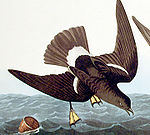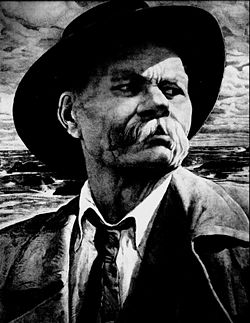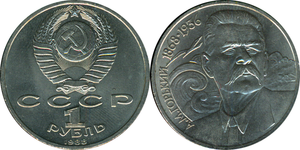
The Song of the Stormy Petrel
Encyclopedia

Russian literature
Russian literature refers to the literature of Russia or its émigrés, and to the Russian-language literature of several independent nations once a part of what was historically Russia or the Soviet Union...
Maxim Gorky
Maxim Gorky
Alexei Maximovich Peshkov , primarily known as Maxim Gorky , was a Russian and Soviet author, a founder of the Socialist Realism literary method and a political activist.-Early years:...
in 1901
1901 in literature
The year 1901 in literature involved some significant new books.-Events:* First Nobel Prize for Literature awarded, to French poet Sully Prudhomme; many are outraged when Leo Tolstoy does not win...
. Written in a variation of unrhymed trochaic tetrameter
Trochaic tetrameter
Trochaic tetrameter is a meter in poetry. It refers to a line of four trochaic feet. The word "tetrameter" simply means that the poem has four trochees...
with occasional Pyrrhic
Pyrrhic
A pyrrhic is a metrical foot used in formal poetry. It consists of two unaccented, short syllables. It is also known as a dibrach.Tennyson used pyrrhics and spondees quite frequently, for example, in In Memoriam: "When the blood creeps and the nerves prick." "When the" and "and the" in the second...
substitutions, it is considered poetry
Poetry
Poetry is a form of literary art in which language is used for its aesthetic and evocative qualities in addition to, or in lieu of, its apparent meaning...
.
History

Nicholas II of Russia
Nicholas II was the last Emperor of Russia, Grand Prince of Finland, and titular King of Poland. His official short title was Nicholas II, Emperor and Autocrat of All the Russias and he is known as Saint Nicholas the Passion-Bearer by the Russian Orthodox Church.Nicholas II ruled from 1894 until...
directly and hope to escape unhappy fate. The language calling for revolution
Revolution
A revolution is a fundamental change in power or organizational structures that takes place in a relatively short period of time.Aristotle described two types of political revolution:...
is coded—the proud stormy petrel, unafraid of the storm
(that is, revolution), as all other animals cower.
Maxim Gorky wrote "The Song of the Storm Petrel" in March 1901 in Nizhny Novgorod
Nizhny Novgorod
Nizhny Novgorod , colloquially shortened to Nizhny, is, with the population of 1,250,615, the fifth largest city in Russia, ranking after Moscow, St. Petersburg, Novosibirsk, and Yekaterinburg...
. It was first published in the Zhizn
Zhizn
Zhizn was a Russian magazine published first in Saint Petersburg , then in London and Geneva .Zhizn began its existence as a general purpose magazine in January 1897. For the first two years it was edited, at various times, by S. V. Voejkov, D. M. Ostafyev, M. V. Kalitin, and M. S. Ermolaev and...
magazine in April 1901. Gorky was arrested for publishing "The Song", but released shortly thereafter.
The poem was later referred to as "the battle anthem of the revolution", and the epithet Burevestnik Revolyutsii (The Storm Petrel of the Revolution) soon became attached to Gorky himself. According to Nadezhda Krupskaya, "The Song" became one of Lenin
Vladimir Lenin
Vladimir Ilyich Lenin was a Russian Marxist revolutionary and communist politician who led the October Revolution of 1917. As leader of the Bolsheviks, he headed the Soviet state during its initial years , as it fought to establish control of Russia in the Russian Civil War and worked to create a...
's favorite works by Gorky.
In honor of the poem, and of Maxim Gorky himself, various things in the Soviet Union—and, in particular, in its Gorky Oblast
Nizhny Novgorod Oblast
Nizhny Novgorod Oblast is a federal subject of Russia . Its administrative center is the city of Nizhny Novgorod. Population: The oblast is crossed by the Volga River. Apart from Nizhny Novgorod's metropolitan area, the biggest city is Arzamas...
—became named "Burevestnik
Burevestnik
Burevestnik was the All-Union Voluntary Sports Society of students and teachers of the most part of high schools and universities in the USSR, established in 1957 .Since 1959 the society was a member of the International University Sports Federation...
" (Storm Petrel), including a national sports club, a series of hydrofoil
Hydrofoil
A hydrofoil is a foil which operates in water. They are similar in appearance and purpose to airfoils.Hydrofoils can be artificial, such as the rudder or keel on a boat, the diving planes on a submarine, a surfboard fin, or occur naturally, as with fish fins, the flippers of aquatic mammals, the...
boats, an air base
Burevestnik Airport
Burevestnik is a military air base on Iturup Island, Russia, establishing the nation's presence on the disputed Kuril Islands with the largest airfield in the region. It is also the former Soviet Union's most remote interceptor base, home of 387 IAP...
in the Kuril Islands
Kuril Islands
The Kuril Islands , in Russia's Sakhalin Oblast region, form a volcanic archipelago that stretches approximately northeast from Hokkaidō, Japan, to Kamchatka, Russia, separating the Sea of Okhotsk from the North Pacific Ocean. There are 56 islands and many more minor rocks. It consists of Greater...
, a labor-union resort by the Gorky Reservoir
Gorky Reservoir
Gorky Reservoir is an artificial lake in the central part of the Volga River formed by a hydroelectric dam of Gorky Hydroelectric Station built in 1955 between the towns of Gorodets and Zavolzhye and filled in 1955 – 1957...
, and a Moscow-Nizhny Novgorod express train. The storm petrel imagery appeared on monuments and memorial coins dedicated to Maxim Gorky.
The bird species in the song

Burevestnik
Burevestnik was the All-Union Voluntary Sports Society of students and teachers of the most part of high schools and universities in the USSR, established in 1957 .Since 1959 the society was a member of the International University Sports Federation...
(modified by appropriate adjectives) is applied to a number of species in the families Procellariidae
Procellariidae
The family Procellariidae is a group of seabirds that comprises the fulmarine petrels, the gadfly petrels, the prions, and the shearwaters. This family is part of the bird order Procellariiformes , which also includes the albatrosses, the storm-petrels, and the diving petrels.The procellariids are...
(many of whose species are known in English as petrels) and Pelecanoididae (diving-petrels). This Russian word is not, however, used to name the species properly known in English as storm-petrel
Storm-petrel
Storm petrels are seabirds in the family Hydrobatidae, part of the order Procellariiformes. These smallest of seabirds feed on planktonic crustaceans and small fish picked from the surface, typically while hovering. The flight is fluttering and sometimes bat-like.Storm petrels have a cosmopolitan...
, or any other species from its family (the Hydrobatidae). However, since the Russian burevestnik can be literally parsed by the speaker as 'the announcer of the storm', it was only appropriate for most translators into English to translate the title of the poem as "Stormy Petrel" (or, more rarely, "Storm Petrel").
Other avian characters of the poem are generic seagulls, loon
Loon
The loons or divers are a group of aquatic birds found in many parts of North America and northern Eurasia...
s (also known as "divers"; Russian, гагара), and a penguin
Penguin
Penguins are a group of aquatic, flightless birds living almost exclusively in the southern hemisphere, especially in Antarctica. Highly adapted for life in the water, penguins have countershaded dark and white plumage, and their wings have become flippers...
. While North Hemisphere loons and south hemisphere penguins are not likely to meet in the wild, their joint participation in the poem is a legitimate example of a poetic license. Or the penguin might refer to the extinct Great Auk
Great Auk
The Great Auk, Pinguinus impennis, formerly of the genus Alca, was a large, flightless alcid that became extinct in the mid-19th century. It was the only modern species in the genus Pinguinus, a group of birds that formerly included one other species of flightless giant auk from the Atlantic Ocean...
, genus Pinguinus, once known commonly as "penguins".
Translations
The Song was translated to many languages (and to almost all officially-recognized languages of RussiaLanguages of Russia
Of all the languages of Russia, Russian is the only official language. 27 different languages are considered official languages in various regions of Russia, along with Russian. There are over 100 minority languages spoken in Russia today.-History:...
). Some examples: german, japan, Hebrew.
The text of the poem
The text in original Russian and English translation follows (the English translation is GFDL; note on translation on the discussion page).Над седой равниной моря ветер тучи собирает. Между тучами и морем гордо реет Буревестник, чёрной молнии подобный. То крылом волны касаясь, то стрелой взмывая к тучам, он кричит, и — тучи слышат радость в смелом крике птицы. В этом крике — жажда бури! Силу гнева, пламя страсти и уверенность в победе слышат тучи в этом крике. Чайки стонут перед бурей, — стонут, мечутся над морем и на дно его готовы спрятать ужас свой пред бурей. И гагары тоже стонут, — им, гагарам, недоступно наслажденье битвой жизни: гром ударов их пугает. Глупый пингвин робко прячет тело жирное в утёсах... Только гордый Буревестник реет смело и свободно над седым от пены морем! Всё мрачней и ниже тучи опускаются над морем, и поют, и рвутся волны к высоте навстречу грому. Гром грохочет. В пене гнева стонут волны, с ветром споря. Вот охватывает ветер стаи волн объятьем крепким и бросает их с размаху в дикой злобе на утёсы, разбивая в пыль и брызги изумрудные громады. Буревестник с криком реет, чёрной молнии подобный, как стрела пронзает тучи, пену волн крылом срывает. Вот он носится, как демон, — гордый, чёрный демон бури, — и смеётся, и рыдает... Он над тучами смеётся, он от радости рыдает! В гневе грома, — чуткий демон, — он давно усталость слышит, он уверен, что не скроют тучи солнца, — нет, не скроют! Ветер воет... Гром грохочет... Синим пламенем пылают стаи туч над бездной моря. Море ловит стрелы молний и в своей пучине гасит. Точно огненные змеи, вьются в море, исчезая, отраженья этих молний. — Буря! Скоро грянет буря! Это смелый Буревестник гордо реет между молний над ревущим гневно морем; то кричит пророк победы: — Пусть сильнее грянет буря!.. |
|

